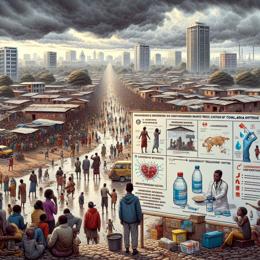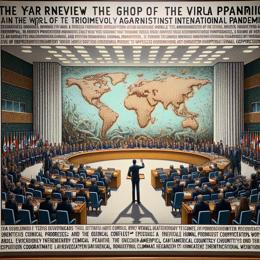Image created by AI
U.S. Abruptly Halts USAID Funding for HIV Programs in South Africa Amid Policy Shifts
In a startling move, the U.S. government has ordered an immediate halt to all USAID-funded HIV programs in South Africa, a decision that undermines decades-long efforts in battling the HIV/AIDS epidemic in one of the most affected regions globally. This termination not only affects direct healthcare services but also puts numerous lives at risk, particularly in vulnerable communities dependent on these critical health interventions.
South Africa, which battles one of the highest rates of HIV infection worldwide, has benefited significantly from the President’s Emergency Plan for AIDS Relief (PEPFAR) since its inception in 2003. PEPFAR has been a cornerstone in global HIV response efforts, with the U.S. investing approximately $8 billion (around R145 billion) in the country to date. The 2024-2025 funding cycle alone earmarked $439 million (about R8.1 billion) for ongoing and new projects.
The sudden cessation was communicated through termination letters sent to organizations like the Anova Health Institute and various tuberculosis (TB) programs, both crucial components in the region’s healthcare framework. These letters, dictated by a directive from U.S. Secretary of State Marco Rubio, in his capacity as the Acting Administrator for USAID, and Peter W. Marocco, cited alignment with U.S. governmental priorities and national interest as reasons for the termination.
This move is part of a broader initiative under Donald Trump's administration, which has seen a global freeze on aid, aligning with a more isolationist approach from the U.S. government. The decision has been met with widespread criticism, both locally and internationally. Health experts and rights activists argue that the withdrawal of these funds will lead to increased HIV transmission rates, disruption of antiretroviral therapy, and a general decline in health outcomes for a population already facing significant health disparities.
Such policy shifts come at a time when political tensions between the U.S. and South Africa are palpable, with Trump’s remarks on South Africa's internal land reform policies and hints at sanctions against top ANC officials exacerbating the situation. Despite the global solidarity required to combat health crises, such as the HIV/AIDS epidemic, the current U.S. administration’s policies reflect a stark departure from collaborative efforts, prioritizing national over global interests.
The termination of these funds poses a serious question about the future of HIV prevention and treatment in South Africa, and whether local entities and the South African government can sustain the efforts initiated and supported by international aid. The significant advancements made in controlling and reducing HIV incidence rates in the region are at risk, potentially overturning years of progress in public health.




